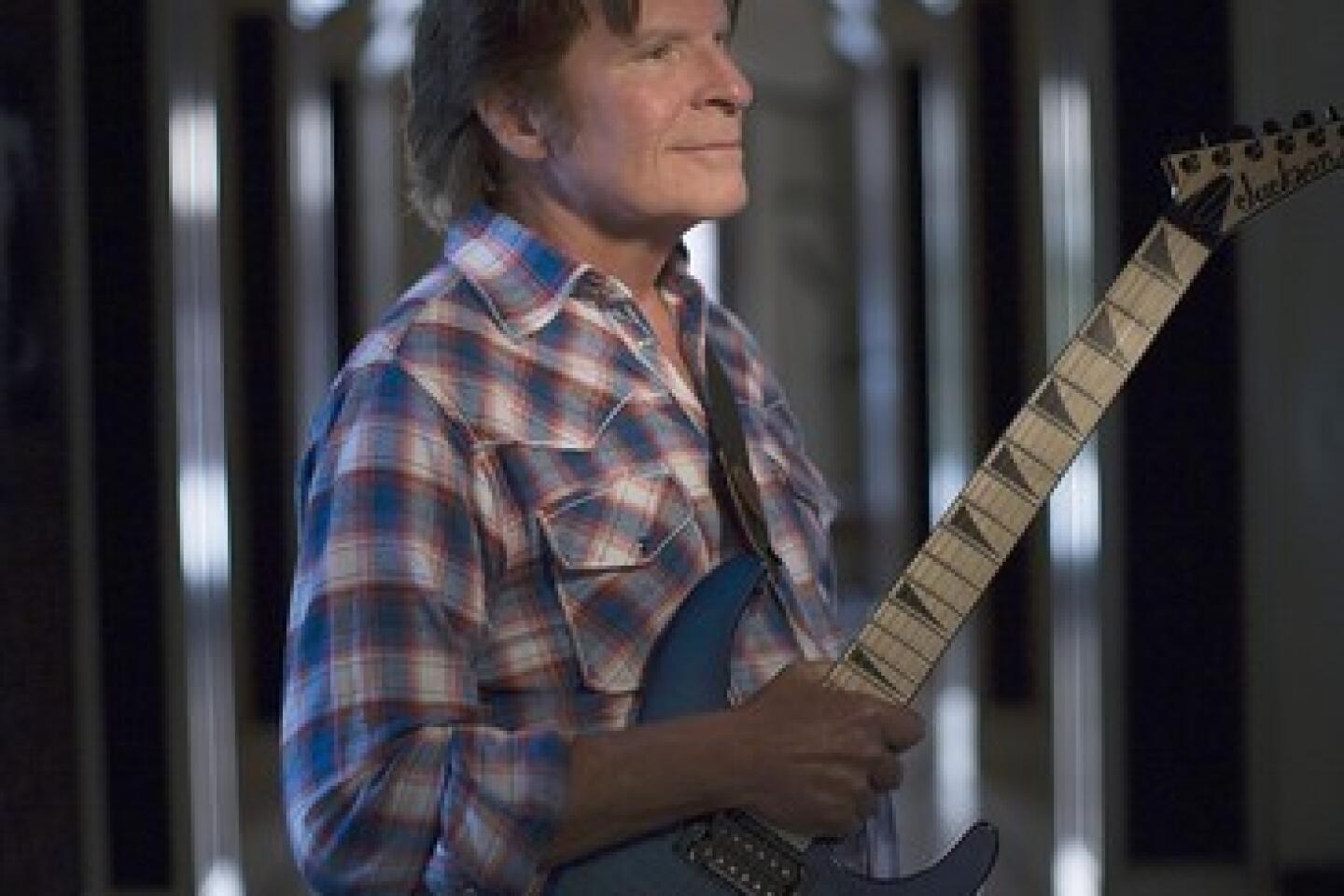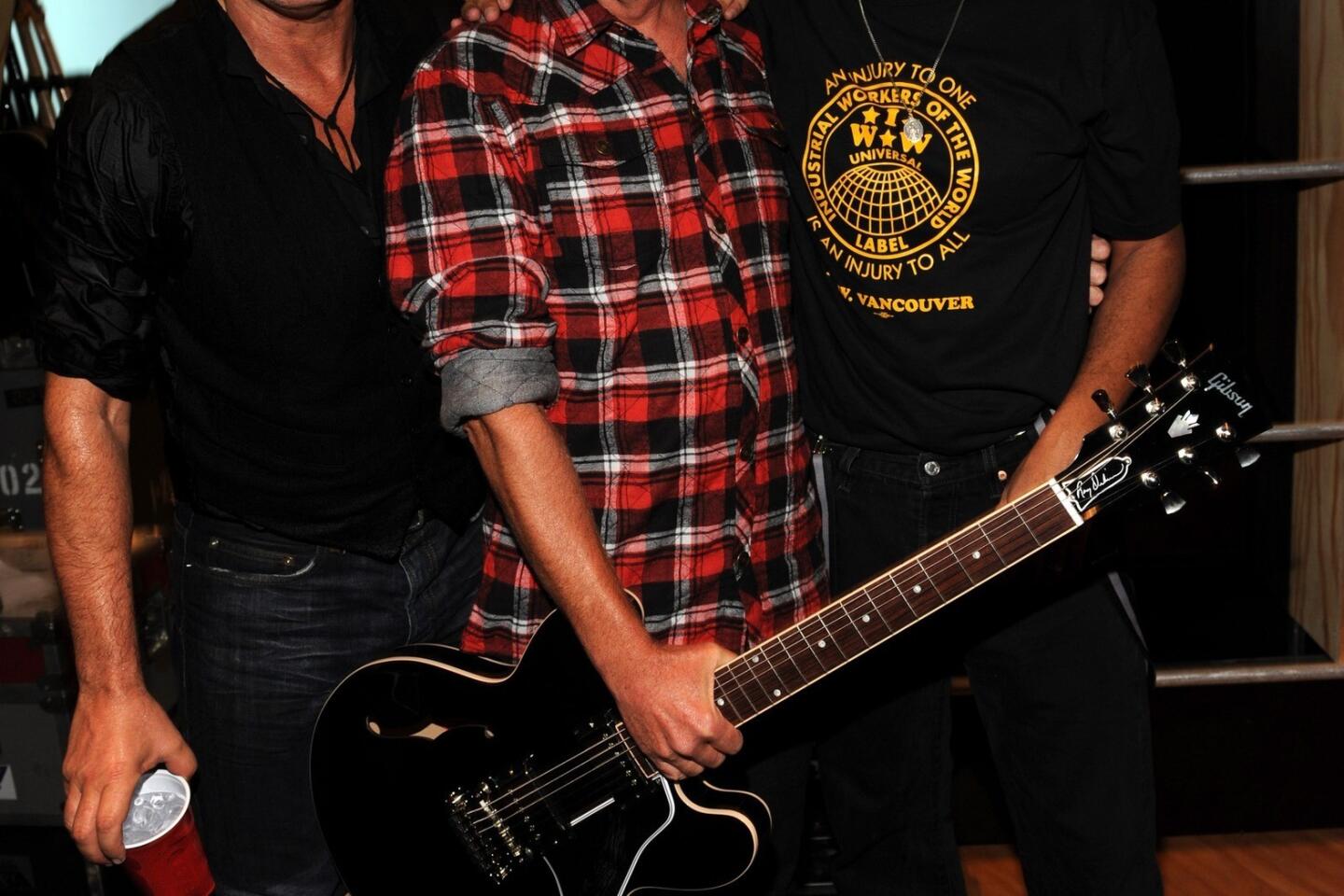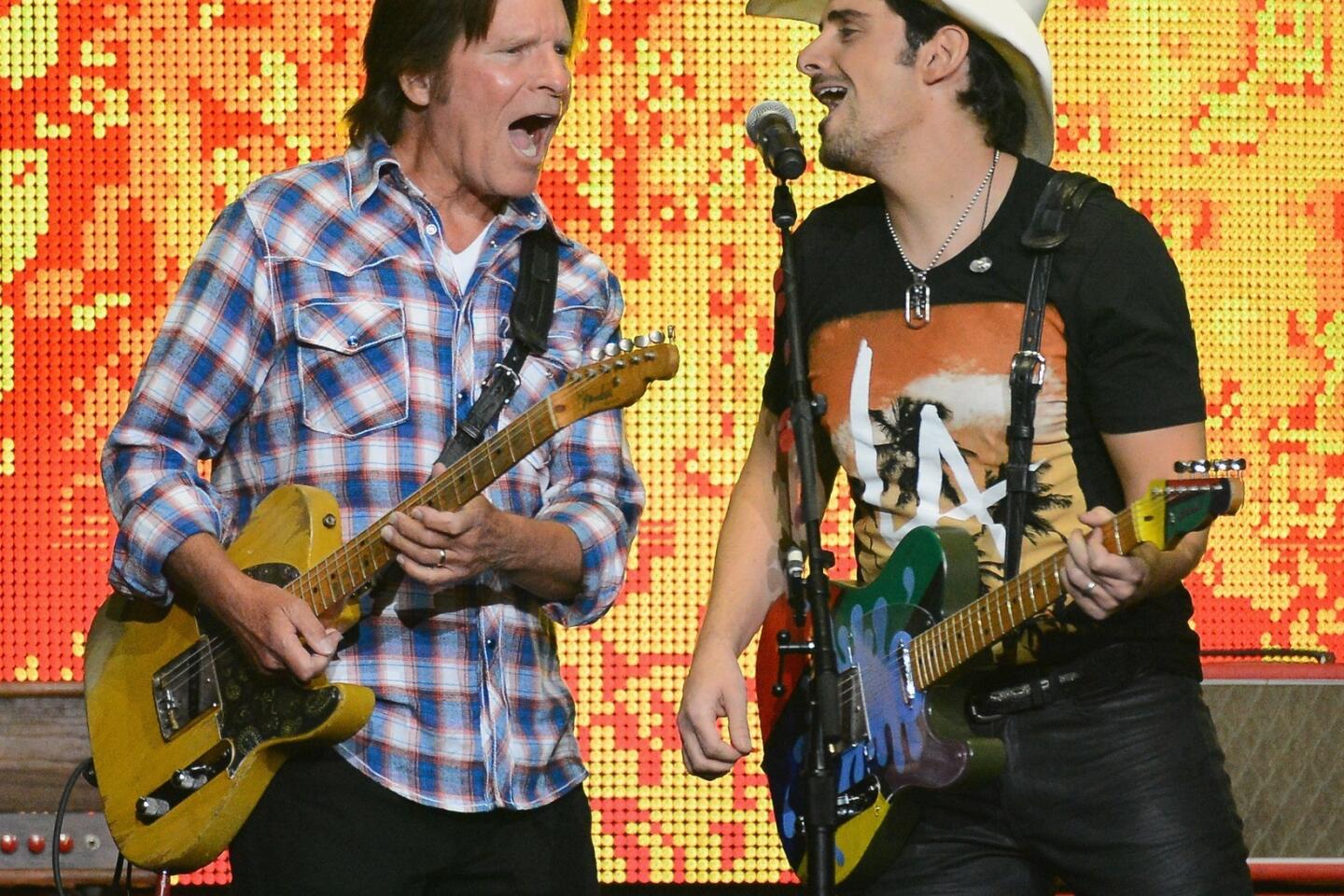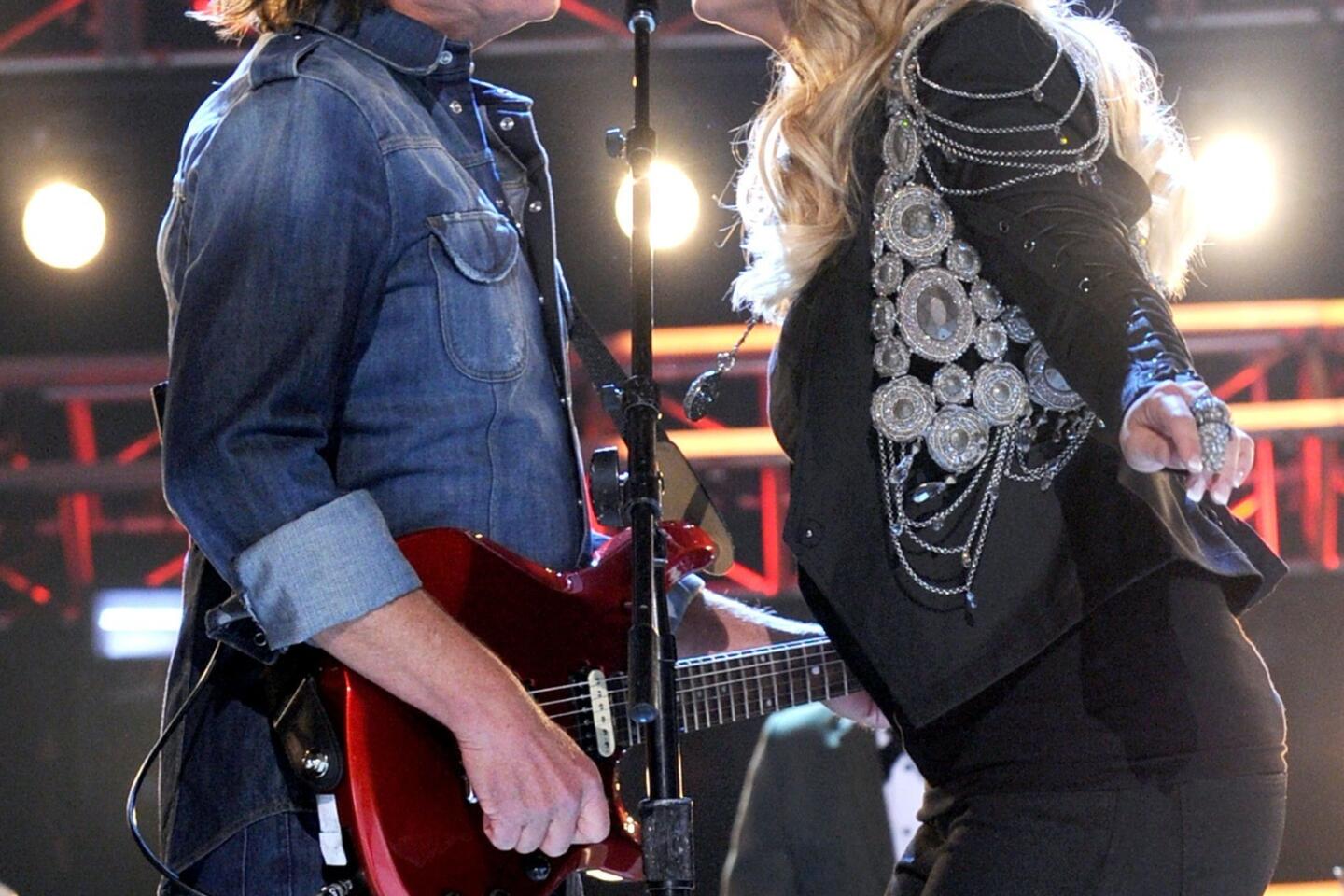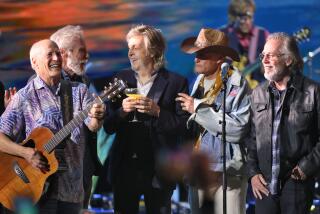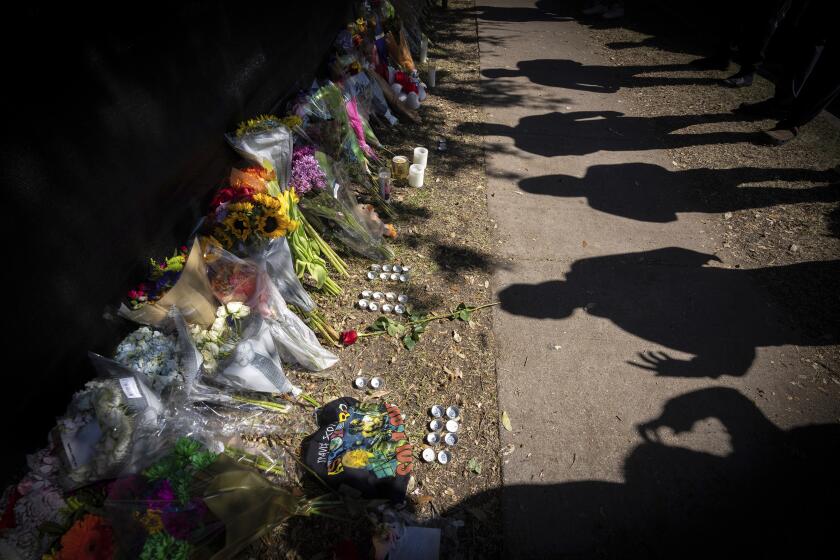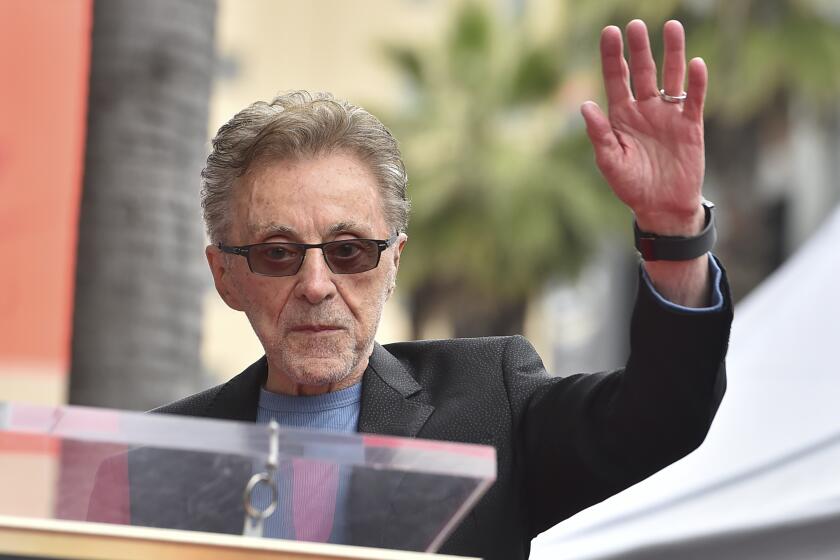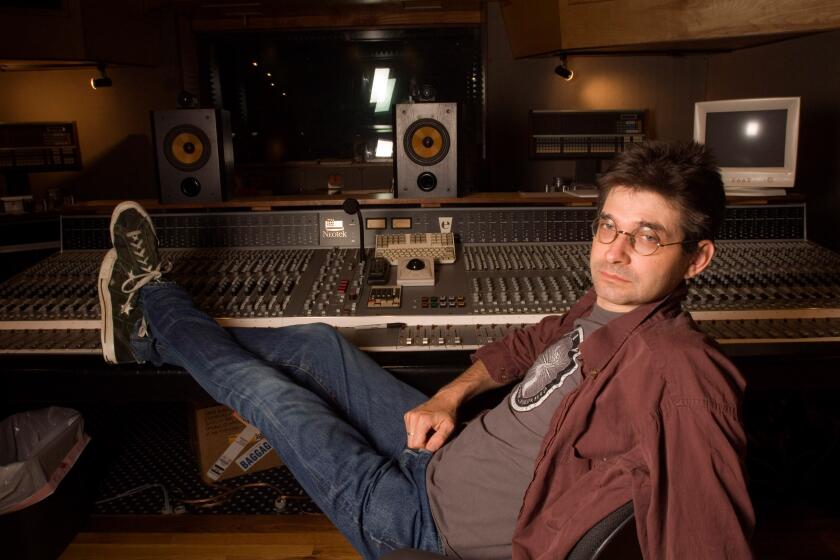John Fogerty takes a new tack with his classic songs
When John Fogerty’s wife, Julie, suggested over dinner one night that he revisit his catalog of Creedence Clearwater Revival songs with artists he admires today, he wasn’t about to let the music take a back seat to technology.
“I realize nowadays with the ease of digital that a lot of stuff gets made by emailing files around,” said Fogerty, who turns 68 on Tuesday, the same day his new album, “Wrote a Song for Everyone,” is released and he headlines a show at the El Rey Theatre. “I wanted it all to take place in the same room, kinda old school, as it were. And that’s how it happened. And since we’re in the same room at the same time, you’re a collaborator even if you don’t realize it.”
Among those who joined Fogerty in various studios for his new album: rockers Dave Grohl and Foo Fighters, Bob Seger and Kid Rock, country stars Brad Paisley, Miranda Lambert, Keith Urban and Alan Jackson, young indie-rock groups My Morning Jacket and Dawes and R&B-pop star Jennifer Hudson.
Fogerty and Foo Fighters muscle their way through the strafing guitar riffs of “Fortunate Son,” he and Urban anticipate the joys of an impending weekend in “Almost Saturday Night.” He meets the Zac Brown Band halfway between his own classic swamp rock and their Southern boogie groove for a bouncy revision of “Bad Moon Rising,” and delves into the latent spirituality of the stately title track with Miranda Lambert, for which Fogerty delegated guitar solo duties to Rage Against the Machine / the Nightwatchman guitarist Tom Morello.
Fogerty cites his performance with Lambert of the title track, a song that elucidates a soldier’s thoughts as he’s about to be sent off to war, as a prime example of what happens when musicians share the same physical space. Fogerty and Lambert trade verses before there’s a break for an instrumental solo.
“I had always assumed there’d be sort of … can I just call it ‘a hippie solo’?” he said with a chuckle. “I’m not quite sure what that means. Part of me thought it would be kind of Van Morrison’s ‘Brown Eyed Girl,’ or maybe like [Rod Stewart’s] ‘Maggie May,’ some kind of hippie guitar there. I tried that over the next few months, but the hippie solo just wasn’t working — I’d outgrown the patchouli oil, I guess,” Fogerty said with an easy laugh.
“I’d been in the studio with Miranda. I remember when it got to the part for the solo, she had shouted out, ‘A face-melting guitar solo!’ I thought it would be cool if I did something kinda like Tom Morello. Then I backed off and said, ‘No, I’m going to call Tom Morello.’”
Morello said he couldn’t have been more thrilled — as a fellow guitarist and as a lover of the kind of socially minded music Fogerty put into the pop mainstream four decades ago.
PHOTOS: Iconic rock guitars and their owners
Lambert remembers hearing Creedence records regularly growing up in Lindale, Texas, thanks to her father’s record collection.
“He always played those songs,” she said. “People always say I’m very country, but I also love classic rock, and that began with Creedence Clearwater Revival. It was the first thing I was introduced to that wasn’t country music. I just loved it — it sounded different than anything I’d ever heard. That voice is so distinctive; the way he sings, the sound of the guitar — it’s obvious from the first note who it is.”
Making, remaking classics
As the architect of one of the great bodies of work in rock music, John Fogerty wrote, sang lead vocals, played lead guitar, recorded and produced hit after hit in the late 1960s and early 1970s for Creedence Clearwater Revival. The Bay Area quartet also featuring his brother, rhythm guitarist Tom Fogerty, bassist Stu Cook and drummer Doug Clifford.
Many of Creedence’s songs — “Fortunate Son,” “Who’ll Stop the Rain,” “Proud Mary,” “Bad Moon Rising” — not only brought an infectious, swampy Southern-rooted rock sound onto the pop radio airwaves, Fogerty’s lyrics also called out social and political injustices and generational tensions over the Vietnam War that were raging at the time.
Ironically, the world may have an Army drill sergeant to thank for the music that landed Fogerty and his bandmates in the Rock and Roll Hall of Fame in 1993. During a remarkably prolific period from 1969 to 1972, Creedence landed 15 songs in the Top 20 of Billboard Hot 100 singles chart and six studio albums in the upper reaches of the magazine’s album chart. Their “Cosmo’s Factory” album spent nine weeks at No. 1 in 1970.
PHOTOS: Best albums of 2012 | Randall Roberts
“I was on active duty in the Army in 1967, marching around on a parade field, endlessly, hour after hour after hour,” Fogerty said recently in Beverly Hills for which he wore one of the plaid flannel shirts that long ago became his signature, denim jeans and black boots.
“They had this mile-square parade field, and they just marched you and marched you, because they had all these guys, and they didn’t know what to do with them till they shipped them out,” he said. “So you just marched.”
“Doing that marching in 115-degree, high-humidity heat, I think I became delirious, and started to write the song that became ‘Porterville,’” he recalled, referencing one of the songs from Creedence’s 1968 debut album. “Certainly when you’re being that thoughtful, it isn’t, ‘Boy meets girl, la la la, why did you break my heart?’ That was really the first thing where I was going outside myself and writing what was basically a narrative.
“At the time I was only 22, it was more just a reaction, a knee-jerk reaction, but when I came home what I realized was that that process worked for me,” he said. “I could write a story. I could put myself anywhere and make a story — and it seemed like I was really pretty good at that.
Indeed, the vast majority of Fogerty’s original songs for Creedence were such narratives — virtually no standard-issue love songs.
“Proud Mary” celebrated life along the Mississippi River in Louisiana; “Who’ll Stop the Rain” poetically framed the anguish felt in many quarters in the U.S. over the thousands of American soldiers killed in Vietnam at the height of that conflict; “Bad Moon Rising” warned of an approaching apocalypse of biblical proportion in three minutes of snappy guitar-driven rock verses and a chorus.
PHOTOS: Academy of Country Music Awards 2013 highlights
Those songs are among a dozen given new treatments on the new album, his 10th solo collection since Creedence called it quits in 1972. Equally significant are two new songs on the collection — “Mystic Highway” and “Train of Fools” — that stand alongside the quality of the work that earned him his place in the Rock Hall of Fame.
“I think of this as being a really high watermark in my career,” said Fogerty, who also has been more active touring over the last two decades than he was after the demise of Creedence. A resident of L.A. for the last couple of decades, he’s also been busy raising his four children with Julie, whom he married in 1991. “I would say this is certainly the best record I’ve ever been on. I even hesitate to call it ‘my record’ because there are so many people here contributing. But I do feel it’s really, really special.”
Fogerty is a revered elder to most of his partners on the new album, except for Seger, who’s three weeks older, although Creedence’s success was full-blown before Seger found his way out of local fame in Detroit and onto the national sales charts.
Seger sings one of Fogerty’s most lauded songs in a quietly stately arrangement that grew out of another bit of in-studio serendipity.
“That version of ‘Who’ll Stop the Rain’ is really a glorious thing,” Fogerty said. “Bob kind of saw it being a fairly traditional arrangement. He thought it was going to be 1-2-3 and the whole band was in. There’d be that guitar riff from the old record and then one of us would start singing.
“We all showed up at a studio in Nashville and we talked it over, trading lines, then I had to get busy as a producer and get the drums set up,” he said. “Then I hear Bob over in the corner, he’s got his acoustic [guitar]. He’s a typical artist, he wants to be sure he’s got his game, he knows his lines. And I just hear that the guitar — it’s that same sound from ‘Night Moves,’ so you’re already iconic. Then I hear [in a gravelly impression of Seger]: ‘Long as I remember.’ [Long pause] And I go, ‘We’ve gotta have that on the record.’
“I said, ‘Bob, your voice sounds like it’s coming down from the mountain — it’s either God, or it’s Moses. But it’s something pretty great up on that mountain’.”
Twitter: @RandyLewis2
More to Read
The biggest entertainment stories
Get our big stories about Hollywood, film, television, music, arts, culture and more right in your inbox as soon as they publish.
You may occasionally receive promotional content from the Los Angeles Times.
